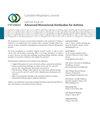使用第一代或第二代表皮生长因子受体(EGFR)酪氨酸激酶抑制剂治疗临床 IIIB 期或 IIIC 期肺癌和表皮生长因子受体(EGFR)突变患者的最终放疗疗效
IF 2.1
4区 医学
Q3 RESPIRATORY SYSTEM
引用次数: 0
摘要
背景。对于临床分期为 IIIB 或 IIIC 期、表皮生长因子受体(EGFR)突变并接受过第一代或第二代 EGFR 酪氨酸激酶抑制剂(TKIs)治疗的肺腺癌患者,确定性放疗(RT)的有效性尚不明确。研究方法这项回顾性队列研究使用了台湾癌症登记处的数据,以确定2011年至2020年间确诊为表皮生长因子受体(EGFR)突变的IIIB期或IIIC期肺腺癌的成年患者。接受第一代或第二代EGFR TKIs治疗的患者分为RT组和非RT组。采用倾向评分(PS)加权法平衡各组间的协变量。主要结果是总生存期(OS),肺癌死亡率(ILCM)作为补充结果。为评估研究结果的稳健性,还进行了其他补充分析。研究结果在 270 名符合条件的患者中,41 人接受了 RT 治疗,229 人未接受 RT 治疗。中位随访 46 个月后,PS 加权分析显示,与非 RT 组相比,RT 组的 PS 加权死亡危险比为 0.94(95% CI:0.61-1.45,)。两组的 ILCM 发生率无明显差异。补充分析结果一致。结论在第一代或第二代表皮生长因子受体 TKI 治疗的基础上加用确定性 RT 并不能明显改善表皮生长因子受体突变 IIIB 期或 IIIC 期肺腺癌患者的 OS。NCT03521154NCT05167851.本文章由计算机程序翻译,如有差异,请以英文原文为准。
Efficacy of Definitive Radiotherapy for Patients with Clinical Stage IIIB or IIIC Lung Adenocarcinoma and Epidermal Growth Factor Receptor (EGFR) Mutations Treated Using First- or Second-Generation EGFR Tyrosine Kinase Inhibitors
Background. The effectiveness of definitive radiotherapy (RT) for patients with clinical stage IIIB or IIIC lung adenocarcinoma and epidermal growth factor receptor (EGFR) mutations who received first- or second-generation EGFR tyrosine kinase inhibitors (TKIs) is unclear. Methods. Taiwan Cancer Registry data were used in this retrospective cohort study to identify adult patients diagnosed with EGFR-mutated stage IIIB or IIIC lung adenocarcinoma between 2011 and 2020. Patients treated with first- or second-generation EGFR TKIs were classified into RT and non-RT groups. Propensity score (PS) weighting was applied to balance covariates between groups. The primary outcome was overall survival (OS), and the incidence of lung cancer mortality (ILCM) was considered as a supplementary outcome. Additional supplementary analyses were conducted to assess the robustness of the findings. Results. Among 270 eligible patients, 41 received RT and 229 did not. After a median follow-up of 46 months, PS-weighted analysis showed the PS-weighted hazard ratio of death for the RT group compared to the non-RT group was 0.94 (95% CI: 0.61–1.45, ). ILCM rates did not differ significantly between the two groups. Supplementary analyses yielded consistent results. Conclusion. The addition of definitive RT to first- or second-generation EGFR TKI treatment does not significantly improve OS of patients with EGFR-mutated stage IIIB or IIIC lung adenocarcinoma. NCT03521154NCT05167851.
求助全文
通过发布文献求助,成功后即可免费获取论文全文。
去求助
来源期刊

Canadian respiratory journal
医学-呼吸系统
CiteScore
4.20
自引率
0.00%
发文量
61
审稿时长
6-12 weeks
期刊介绍:
Canadian Respiratory Journal is a peer-reviewed, Open Access journal that aims to provide a multidisciplinary forum for research in all areas of respiratory medicine. The journal publishes original research articles, review articles, and clinical studies related to asthma, allergy, COPD, non-invasive ventilation, therapeutic intervention, lung cancer, airway and lung infections, as well as any other respiratory diseases.
 求助内容:
求助内容: 应助结果提醒方式:
应助结果提醒方式:


